第49章
Here white lover and red lover had metand fought: with the same high spirit and overstrung will, scorn of danger, greed of pain; the same vehemence of hatred and excess of revenge; the same ideal of a hero as a young man who stands in the thick of carnage calm and unconscious of his wounds or rushes gladly to any poetic beauty of death that is terrible and sublime.And already the red lover was gone and the fair-haired lover stood the quiet owner of the road, the last of all its long train of conquerors brute and human--with his cabin near by, his wife smiling beside the spinning-wheel, his baby crowing on the threshold.
History was thicker here than along the Appian Way and it might well have stirred O'Bannon; but he rode shamblingly on, un-touched, unmindful.At every bend his eye quickly swept along the stretch of road to the next turn;for every man carried the eye of an eagle in his head in those days.
At one point he pulled his horse up violently.A large buckeye tree stood on the roadside a hundred yards ahead.Its large thick leaves already full at this season, drew around the trunk a seamless robe of darkest green.But a single slight rent had been made on one side as though a bough bad been lately broken off to form an aperture commanding a view of the road; and through this aperture he could see something black within-as black as a crow's wing.
O'Bannon sent his horse forward in the slowest walk: it was unshod; the stroke of its hoofs was muffled by the dust; and he had approached quite close, remaining himself unobserved, before he recognized the school-master.
He was reclining against the trunk, his hat off, his eyes closed; in the heavy shadows he looked white and sick and weak and troubled.Plainly he was buried deep in his own thoughts.If he had broken off those low boughs in order that he might obtain a view of the road, he had forgotten his own purpose; if he had walked all the way out to this spot and was waiting, his vigilance had grown lax, his aim slipped from him.
Perhaps before his eyes the historic vision of the road had risen: that crowded pageant, brute and human, all whose red passions, burning rights and burning wrongs, frenzied fightings and awful deaths had left but the sun-scarred dust, the silence of the woods clothing itself in green.And from this panoramic survey it may have come to him to feel the shortness of the day of his own life, the pitifulness of its earthly contentions, and above everything else the sadness of the necessity laid upon him to come down to the level of the cougar and the wolf.
But as O'Bannon struck his horse and would have passed on, he sprang up quickly enough and walked out into the middle of the road.When the horse's head was near he quietly took hold of the reins and throwing his weight slightly forward, brought it to a stop.
"Let go!" exclaimed O'Bannon, furious and threatening.
He did let go, and stepping backward three paces, he threw off his coat and waistcoat and tossed them aside to the green bushes: the action was a pathetic mark of his lifelong habit of economy in clothes: a coat must under all circumstances be cared for.He tore off his neckcloth so that his high shirt collar fell away from his neck, showing the purple scar of his wound;and he girt his trousers in about his waist, as a laboring man will trim himself for neat, quick, violent work.Then with a long stride he came round to the side of the horse's head, laid his hand on its neck and looked O'Bannon in the eyes:
"At first I thought I'd wait till you got back to town.I wanted to catch you on the street or, in a tavern where others could witness.I'm sorry.I'm ashamed I ever wished any man to see me lay my hand on you.
"Since you came out to Kentucky, have I ever crossed you? Thwarted you in any plan or purpose? Wronged you in any act? Ill-used your name? By anything I have thought or wished or done taken from the success of your life or made success harder for you to win?